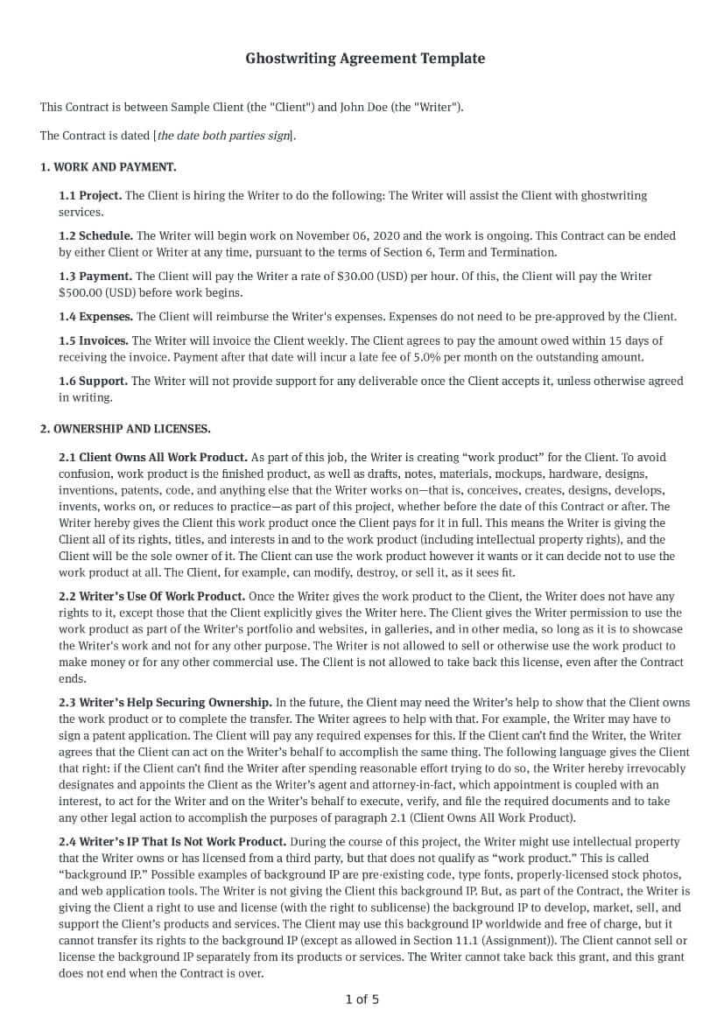“What Is Ghostwriting?” And Other Questions Answered

Table of Contents
- What Is Ghostwriting?
- Who Are Ghostwriters?
- How to Do Ghostwriting
- 15 Questions About Ghostwriting Answered
- Key Takeaways
- Conclusion
If you are new to content writing, the term “ghostwriting” would have got your attention. In the literary world, everyone dabbles in it once, yet no one talks about it too much. And that’s why the question, “What is ghostwriting?”
Often, prominent personalities hire ghostwriters when they want to convey their message to a large audience, but find themselves incapable of penning down their thoughts. In such cases, the client is listed as the author, as if they wrote the piece on their own, while the ghostwriter receives a proposed amount in lieu of it. Sometimes, the money involved in the business is huge, which makes it a lucrative moonlight option for many writers. Now, let’s try to decipher what ghostwriting really means, and how you can make the best of this opportunity.

What Is Ghostwriting?
So, how does ghostwriting work? Ghostwriting is writing content on behalf of someone, professionally. When a client wants to come up with a speech, a book, a blog, an autobiography, or any other type of content they cannot pen down on their own due to some constraints, they hire a professional writer who does the job on their behalf. In a nutshell, ghostwriting can be concluded as a writing job in which the client is recognized for the work done, while the original writer settles for a payment for their writing services.
Who Are Ghostwriters?
A ghostwriter is someone who works behind the curtains. They are hired to put pen to paper for literary texts or other types of content that are meant to be credited to clients. So, a ghostwriter is the writer who does the actual work and whose name cannot be seen in the byline.

Ghostwriters may either work on an entire project solely or team up with their client to co-author the required content. A professional ghostwriter is able to adapt to different writing styles to fit each client’s requirements. They comprehend the client’s vision, and often advise them on any content or style issue, if required.
How to Do Ghostwriting
Ghostwriting is not an easy job. Becoming a ghostwriter is not everyone’s dream, and especially so, if you are someone seeking praise and accolades for the job done. However, if you are okay with being the one who works behind the scenes, go ahead!
If you are trying to expand your business network and delve into a lucrative business sans brainstorming new ideas all the time, this path is for you. Basically, the definition of ghostwriting states that none of your work’s credit goes to you. Although, bear in mind that ghostwriting is consensual. The client and the ghostwriter agree to certain terms and conditions, including the following.
- Total number of words
- Research for content
- Number of editing rounds
- Client’s approval at every stage
- Time duration
- Cost per word/per page
- Payment methods
If you are wondering how to become a ghostwriter, then here is an outline to help you break into this lucrative business.
- Try to understand what a ghostwriter does.
- Commence your career by freelancing.
- Create a portfolio.
- Learn to work on large projects to up your game.
- Learn to adapt to different writing styles to meet each client’s requirements.
- Try to network with professionals and find opportunities.
- Work on your collaborative skills and strengthen them.
- Maintain good relationships with your network of clients.
15 Questions About Ghostwriting Answered
If you want more information on ghostwriting, you can take a peek at the below-mentioned frequently asked questions, for it may satiate your curiosity.
1. What skills do you need to be a ghostwriter?
A ghostwriter is not just a writer, but a good listener as well. You need to understand where the client is coming from, and lend your voice to their idea. Try to listen to their ideas without anticipating whether they are right or wrong. A great ghostwriter’s focus is on the client’s vision and putting them onto paper seamlessly. When learning how to be a ghostwriter, always remember to prioritize your client’s needs.
2. How can you demonstrate their work, given there’s no credit for the job done?
Try to develop a good relationship with your client. Once you are done with the work, you can request them to allow you to disclose that you have done ghostwriting for them. Some may even recommend you to a prospective client.
You can simply mention on your resume the client(s) you have been doing ghostwriting for. Or you can also dedicate a part of your contract to the disclosure of your work as a ghostwriter. Make sure your client is in agreement with it.
3. How can you market yourself as a ghostwriter?
Here are a few ways to market yourself as a ghostwriter.
- Build a website. You can also incorporate the term “ghostwriting” on the website for better reach. It’s easy for clients to find you that way.

- You can also ask for referrals, and send emails to previous clients to remind them that you’re around.
- Another way to market yourself is by opting for guest blogging. As guest blogging allows you to pen the content under your name, there are chances that the blog’s traffic comes to your website as well.
- Apart from that, you can market yourself via social media. Join a Facebook group dedicated to writers, and publicize your services.
4. What is ghostwriting done for?
Ghostwriting is normally used for content marketing. The types of content for which a ghostwriter is hired comprise the following.
- Website content
- Blogs
- Social media posts
- Email marketing
- Memoirs
- Video scripts
- Ebooks
5. Is ghostwriting legal?
A ghostwriter comes into the picture when someone cannot write on their own, due to some constraints. Moreover, when an author hires a writer, the idea behind the book belongs to the client, while the ghostwriter is there to pen down their thoughts systematically. So, ghostwriting is very much legal, as the hired writer is offering their services in lieu of an agreed-upon amount.
6. How much can you charge for ghostwriting?
Often, people say they don’t know how to do ghostwriting effectively, as they believe their companions receive better rates for the same job while they are struggling. You need to analyze the amount of work you are supposed to do, and the hours you will require to complete it. Decide your charges accordingly. Also, do some market research before finalizing your rate. You may charge either per word, per page, or depending on the kind of work you are going to do.
7. Does a ghostwriter need a lawyer to handle contracts?
Not necessarily. Try to maintain a professional relationship with your clients, and be clear about your requirements in advance. You may create your own contract that states terms and conditions, so you do not have to figure out later what you are seeking from the client.
8. What may a ghostwriting contract contain?
Ghostwriting is an agreement, where it is pre-decided that the original writer will not get any credit for the work done. Besides that, the contract should specifically mention the price that is negotiated between the two parties. It should be based on certain parameters, including the experience and proficiency of the ghostwriter. The contract should protect the rights of both the parties involved. Mentioned below is a sample of a ghostwriting agreement.

9. How much can ghostwriters earn?
Although most ghostwriters charge money basis per word or per page for the work done, it depends on the quantity of work you are doing. Ghostwriting as an academic writer, in an entertainment industry, or for a fiction book can fetch you a good amount of money. What’s more, ghostwriting can even get you a book deal with a publisher.
10. How to create a portfolio when being a ghostwriter?
To create a portfolio, you need to have credentials at your end. You can start off with a blog, which may help you land a small ghostwriting gig initially. As your clientele increases, you can add them to your portfolio (with explicit permission, of course).
11. Can you get in trouble for ghostwriting?
As long as the ghostwriter does not violate any rules or plagiarize someone’s work, ghostwriting is a totally legal practice.
12. What are the benefits of working as a ghostwriter?
Here are the benefits of working as a ghostwriter.
- A bevy of interesting projects to work on
- Upfront payment for the job done
- Reaching a wider audience
13. What is the scope of ghostwriting during COVID-19?
It has been observed that the pandemic has seen the interest in ghostwriting increase by around 400%. You can expect the business to only keep thriving in the years to come.
14. Which ghostwriting services can you tap into?
A ghostwriter can be hired for the following purposes.
- Academic writing
- Content writing
- Book writing
- Thesis writing
- Writing of novels, biographies, or memoirs
15. What are some reasons to hire a ghostwriter?
One may hire a ghostwriter in the following situations.
- Lack of knowledge regarding the job
- Lack of interest to complete the task on their own
- Lack of time
- No knowledge of SEO optimization
Key Takeaways
- Ghostwriting is writing content on behalf of someone, and getting paid for it.
- Make the most of social media. Advertise on Facebook and other social media platforms that you are open to be hired as a ghostwriter.
- If you are into the freelancing business, you might already be aware of SEO content. Learn to write articles that improve your clients’ SEO rank. And, you might just find yourself getting a good amount of work coming your way.
- Always strive to meet the deadline you agreed upon, for you are paid for your services. However, not all days are the same. In such cases, talk through the issue, and sort it out beforehand.
- It is recommended to have a clear understanding of what you want, in advance.
- It is advisable to come up with a contract that protects both parties’ rights.
Conclusion
Being a ghostwriter is not everyone’s cup of tea. However, if you are interested in running a lucrative business, and ready to take all the risks attached to this game, go ahead. But, before you hop on to this journey, it is advised to understand ghostwriting and everything that revolves around it. The above guide, which answers the question, “What is ghostwriting?” will hopefully help you make the decision.
Latest Blogs
Learn how to rank on AI search engines like ChatGPT, Perplexity, and Gemini by optimizing your content for authority, structure, and relevance. Stay ahead in AI-driven search with this strategic guide.
Explore the best healthcare SEO services for your medical practice. Improve online visibility and effectively reach more patients in need of your services.
Discover top social media agencies specializing in banking solutions, enhancing financial services and driving engagement.
Get your hands on the latest news!
Similar Posts

Artificial Intelligence
5 mins read
Top AI Blog Writing Tools for Website Monetization

Blogging
10 mins read
How to Start a Successful Food Blog in 2022

Blogging
4 mins read